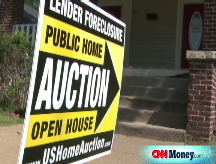Mounting job losses fueling foreclosures
Bad loans were originally the main culprit driving homeowners into foreclosure. But now it's unemployment that's fueling the mortgage meltdown.
| 30 yr fixed | 3.80% |
| 15 yr fixed | 3.20% |
| 5/1 ARM | 3.84% |
| 30 yr refi | 3.82% |
| 15 yr refi | 3.20% |
NEW YORK (CNNMoney.com) -- For years, bad loans and their aftershocks have been sending homeowners into foreclosure. Now it's lost jobs that are putting troubled borrowers over the edge.
As the economy tanks, unemployment is the major factor driving a much larger proportion of foreclosures now than in the earlier stages of the mortgage meltdown.
In June, 45.5% of all delinquencies reported by Freddie Mac (FRE, Fortune 500) were due to unemployment or the loss of income, according to the company. That's an increase from 36.3% in 2006.
"The two economic factors that most contribute to foreclosures are falling home prices and rising unemployment," said Richard DeKaser, chief economist for National City Corp (NCC, Fortune 500). "It's hard to pay your mortgage when you don't have a job."
And that's a situation that more and more people are finding themselves in. Nearly one million Americans have lost their jobs in 2008. The Bureau of Labor Statistics reported in early October that 159,000 private sector jobs were lost in September, and on Friday, economists expect the BLS to report that 200,000 jobs were lost in October.
"The rise in job losses will increase and extend the delinquency trend," said Doug Duncan, the chief economist for mortgage giant Fannie Mae (FNM, Fortune 500). Foreclosures spiked 71% in September alone according to RealtyTrac.
Chris Berio of Long Island, N.Y., worked in two industries that have been hit particularly hard by layoffs. During the boom he worked in construction as a steam fitter, while also moonlighting as a mortgage broker. Berio, 28, was very confident when he bought a $350,000 fixer-upper in Deer Park in 2006 and took an 11% mortgage to finance it.
In 2007, he lost both of his jobs in quick succession. "I went from making good money to nothing," said the married father of two. Berio was one of the lucky ones: His mortgage was modified in September and its interest rate reduced to 5%.
"The number of people we're helping has tripled," said Sal Pane, founder of the for-profit Amerimod Modification Agency, which helped Berio. "And much of the increase in our business is due to job loss."
Berio has found a new job in what should be a growth industry for years: He's become a foreclosure prevention counselor.
Of course the housing crisis is driving unemployment, which in turn has exacerbated the housing crisis - particularly in bubble states like Florida, Nevada and Arizona.
The unemployment rate in Florida was just 3.3% in May 2006, when the subprime crisis began to emerge - far below the national average of 4.7% at the time. Today Florida's rate stands at 6.6%, well above the current national average of 6.1%
Jacksonville, Fla., resident Paula Seabrooks lost her mortgage brokerage company this year in the wake of the Florida economy's deterioration. She has worked in the industry since 2001, first as a contract underwriter for companies such as Wells Fargo (WFC, Fortune 500). She then opened her own business. Her income dropped from nearly six figures in 2006 to less than $20,000 last year.
Seabrooks bought a $165,000 home in March 2006 and financed it with a hybrid adjustable-rate mortgage, which recently reset to 8.375% interest.
"I thought I'd be doing well," she said, "I took the low rate, intending to refinance within two years."
Seabrooks has a new job, but it pays only $38,000 a year. That is not nearly enough to afford her $1,400 monthly mortgage bill, much less make up the five months of missed payments and fees that now total about $11,000. She's seeking a loan modification with the help of counselors from the National Community Reinvestment Coalition.
Ironically, her new job involves handling applications from people seeking to refinance their own unaffordable mortgages into FHA-insured loans.
"Every other loan application I get, it seems, either the wife or the husband is unemployed," Seabrooks said.
Like Florida, California has seen its economy devastated by the housing meltdown. Foreclosure prevention counselors now have far more clients seeking help because their jobs disappeared, rather than because their adjustable-rate mortgages are resetting.
Wes Lobo, a foreclosure counselor for the Community Housing and Credit Center in Chico, Calif., said that his last three clients on Wednesday were victims of job or income loss.
Lobo says that his clients are mostly middle-class Americans who have lost their jobs and exhausted their savings and investments and can't pay their bills.
One of his clients was employed for years by a used car dealer and had worked his way up to a management position. With auto sales way down, he got laid off and now can't pay his $240,000 mortgage or his $60,000 home equity loan.
With the auto industry on the ropes, his chances of finding work in his original line of work are diminishing. The unemployment rate in the Chico metro area has climbed to 8.1%, up two percentage points over the past 12 months.
If that keeps up, more Chico homeowners will be visiting both the unemployment office and their local foreclosure prevention counselors. ![]()



